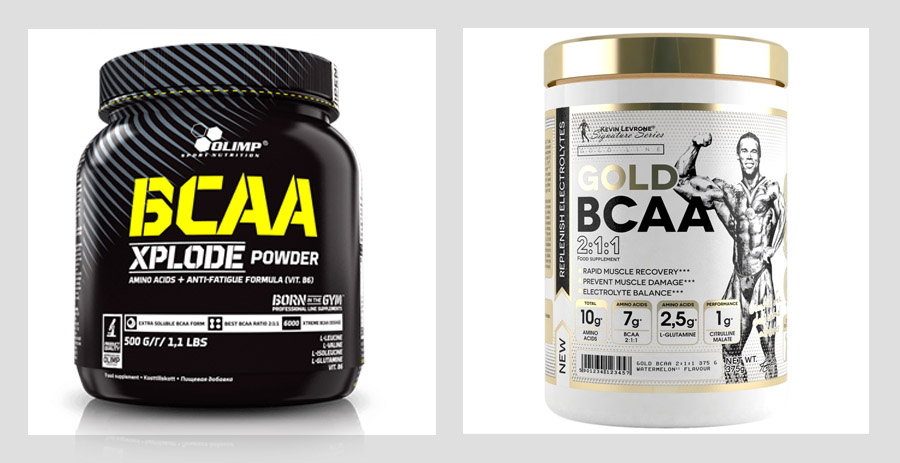BCAA or branched-chain amino acids is a general term for the three essential amino acids - valine, leucine and isoleucine.
They play an important role in metabolism and muscle building.
The body cannot produce them on its own, so they must be obtained from food or in the form of dietary supplements.
What is BCAA in more detail
BCAAs are essential amino acids found in proteins. They are called branched-chain amino acids because the molecular structure of these three components includes branches. They make up about 14% of all amino acids found in muscles.
Leucine is the most common of the BCAAs. It plays an important role in protein synthesis and energy metabolism.
Isoleucine is the second most abundant amino acid. It also plays an important role in protein synthesis and energy metabolism.
Valine is the third most abundant amino acid. It plays an important role in protein synthesis and cognitive function.
Theoretically, our body should receive about 20 different protein compounds from food. Unfortunately, only 10 of them are produced by the body, the rest simply need to be obtained from the outside.
Some of the missing amino acids are made up of these branched chain components. They are considered the best in building muscle material, but they are difficult to obtain from foods rich in protein.
Therefore, this supplement was created to compensate for this deficiency.
Benefits of BCAA
Advantages of use:
Supplement food containing protein;
The use of supplements allows you to build muscle mass;
Have a mild pain-relieving effect after a hard workout;
How to take BCAA
Can be taken in powder, tablet or capsule form.
BCAA powder is the most common form. It can be added to water, smoothies or other drinks.
BCAA tablets and capsules are also convenient options. They usually contain a higher concentration than powder.
Typically, the optimal dosage of BCAA is 3-5 grams. It is important not to exceed 10 grams of protein per day. .
BCAAs can be taken before, during and after exercise. Before exercise, they can help improve endurance and prevent muscle soreness. During exercise, they can help provide energy to your muscles. After a workout, they can help speed up muscle recovery.
You can combine BCAA with most sports supplements, such as creatine, glutamine and protein - just follow the instructions carefully.
Application of BCAA in bodybuilding and powerlifting
Reduces recovery time after training. They promote protein synthesis, which is necessary for muscle recovery after damage.
Increases muscle mass. They help prevent muscle protein breakdown that can occur during intense training.
Increases strength. BCAAs help increase muscle mass, which in turn leads to increased strength.
Application in bodybuilding
In bodybuilding, it is usually taken during and after training. During training, they help provide muscles with energy, and after training, they help speed up recovery.
Application in powerlifting
In powerlifting it is also commonly taken during and after training. During training, they help increase endurance and prevent muscle pain, and after training, they help speed recovery and increase strength.
In general, the optimal dosage is 5-10 grams per day. This amount can be divided into several doses throughout the day.
Contraindications to the use of BCAA
BCAAs are generally safe for most people. However, there are some contraindications to their use, including:
Pregnancy and lactation: The safety of BCAA during pregnancy and lactation has not been established.
Under 14 years of age: The safety of BCAA's in children under 14 years of age has not been established.
Digestive disorders: BCAAs may irritate the gastrointestinal tract in people with digestive disorders.
Kidney and liver disease: BCAAs may damage the kidneys and liver in people with kidney and liver disease.
Content
BCAs are found in high protein foods:
- Vegetable origin – nuts, legumes and seeds;
- Animals – eggs, fish, meat, dairy products;
Additional Tips for Taking BCAA's:
If you are taking this supplement for the first time, start with a small dosage and gradually increase it to test tolerance.
If you have any medical problems, consult your physician before use.
These amino acids are not a substitute for good nutrition and a healthy lifestyle.
BCAAs are a valuable tool for athletes and people who want to improve their health and fitness. When used correctly they can help you achieve your goals.
Conclusions
According to nutritionists, taking dietary supplements is not harmful. If everything is in order with your health, you can eat them in your diet. This is especially true under heavy loads.
BCAA is a safe and effective dietary supplement that aids in athletic performance, particularly strength training. These amino acids help muscle growth and recovery, reduce muscle pain, and increase endurance.



